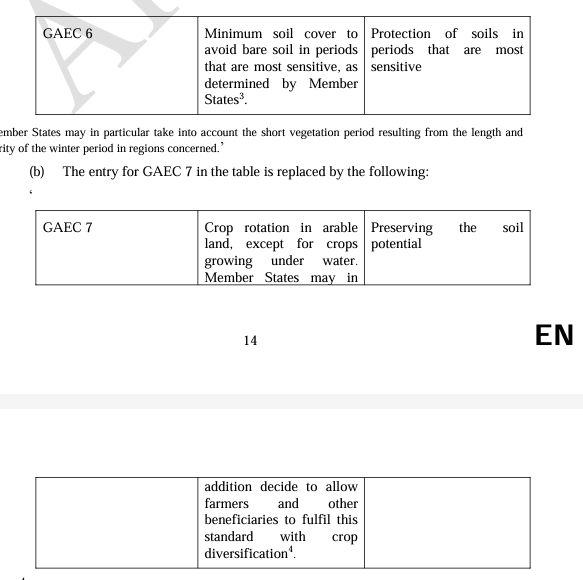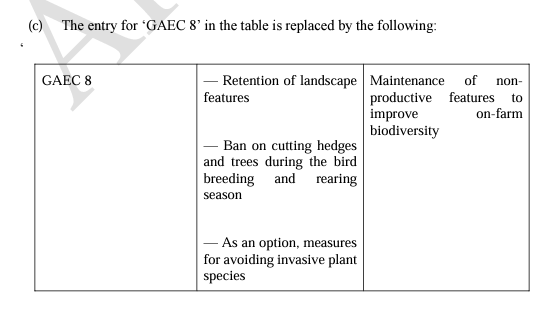
The European Commission plans to shift the EU’s farming subsidy programme from mandatory requirements towards a more ‘voluntary’ approach, proposing to slash or weaken a range of environmental measures, according to a leak of the EU executive’s plans. Natasha Foote and Oliver Moore report.
The plans, which sources say are due to be presented to member states on Friday (15 March), are part of efforts to lighten the administrative load on farmers amid continuing protests against what is seen by protestors as excessive regulation, unfair pricing and trade competition.
The proposed changes offer further flexibilities to member states to adapt implementation to address farmers’ situations. Most fundamentally, this includes changing many conditionality requirements, moving some of these to voluntary schemes.
“On the basis of the changed situation and the experiences in the first year of application, the Commission proposes to rebalance in the direction of a more voluntary approach,” the non-paper reads.
This non-paper is a more detailed version of the delegated regulation published yesterday (12th March) by the Commission (read this in full here – Delegated Regulation).
In the interests of full transparency we have below made the full non-paper available to download. Alongside it, you can access the CAP regulation itself, to compare the two documents for yourself.
Read/Download CAP_Simplification_Proposal_Commission_ARC2020 (Leak)
Read/Download CAP Regulation (EU) 2021/2115
NEW- the Commission’s published proposal: COM(2024)139_0 (as of 15/03/24)
Full title: Proposal for a REGULATION OF THE EUROPEAN PARLIAMENT AND OF THE COUNCIL amending Regulations (EU) 2021/2115 and (EU) 2021/2116 as regards good agricultural and environmental condition standards, schemes for climate, environment and animal welfare, amendments to CAP Strategic Plans, review of CAP Strategic Plans and exemptions from controls and penalties. Original source on the Commission website is here)
Green measures on the chopping block
A number of what are called good agricultural and environmental conditions (GAECs) – mandatory environmental measures tied to CAP funding – are on the Commission’s hit list.
The Commission proposes that member states should be allowed to provide specific exemptions from GAEC standards 5, 6 and 7 – on tillage management, soil cover and fallow land/ landscape features, respectively – in situations where requirements would “run counter to their objectives”.

Here it offers examples of specific agronomic situations for crops on specific soil types and climatic conditions, adding that the obligation on soil cover in sensitive areas has “caused considerable administrative rigidities and uncertainty for farmers”.
The Commission proposes to remove an obligation to devote a minimum share of arable land to non-productive areas – i.e. fallow – or landscape features such as hedges and trees stipulated under GAEC 8.
Instead, member states would be required to make available an eco-scheme offering support to farmers for keeping a share of arable land in non-productive state or to create new landscape features.
This would “clarify that farmers are specifically rewarded for these non-productive areas that are beneficial for biodiversity on farmland and more generally of rural areas,” the non-paper sets out.

With regard to GAEC standard 7 requiring crop rotation, the Commission proposes to keep crop rotation but allow EU countries to add the possibility to fulfil this requirement instead with crop diversification.
Somehow both Simple and Flexible too
Already more responsibility has been delegated to member states – this proposes further subsidiarity.
The proposal includes a general provision to allow member states to allow “temporary and targeted derogations” from certain conditionality requirements in view of increasingly unpredictable weather conditions that can prevent farmers from complying with requirements, such as deadlines in a given year.
Meanwhile, member states would also be able to increase the number of requests for amendment of CAP Strategic Plan, meaning these could be tweaked not just once but now twice per year.
This is needed to “address more quickly farmers’ changing situations, including those caused by adverse weather events,” the Commission sets out.
In addition, three further requests for amendment of the CAP Strategic Plan may be submitted during the duration of the CAP Strategic Plan period, the paper proposes.
Small Farms Exempt, a Treat for Organic Farmers
In specific efforts to reduce burden for small farms, the non-paper proposes to exempt small farms – which it defines as under 10 hectares – from checks and controls, which it maintains is a higher burden for small farms in comparison to bigger ones.
The Commission estimates this will impact up to 65% of CAP beneficiaries.
For organics the non-paper states that “Organic farming is widely considered as the most environment-friendly type of farming contributing by definition to biodiversity and soil health. Organic farmers are already considered under the Regulation to comply with GAEC 7. The Commission will assess whether they could also be considered as complying with GAEC 8 requirements.”
No Impact Assessment
As the situation is considered urgent, there is no impact assessment accompanying it. This means the proposed measures have not been subject to any economic, social or ecological considerations whatsoever:
“With a view to the political urgency of tabling this proposal, which aims to respond to a crisis situation in EU agriculture, no impact assessment has been carried out”
The non-paper acknowledges that this should have been done under Tool 1 of Commission’s ‘better regulation’ guidelines.
Instead, the proposed changes are based on an “ad-hoc consultation process” which lasted “one week”, the non-paper sets out.
This consultation is based on feedback from “four main EU farming organisations” – which are not named in the document – as well as input received from the member states collected by the Council Presidency and the European Parliament.
No reference is made to any other consultation with, or consideration of the needs of, any other sectors.
Next Steps
The Commission may as early as Friday propose these legislative changes to the CAP. It remains to be seen whether the Parliament and Council will be able to push the measures through unamended in this term, and if the timeline allows for it. To do so it will need to follow rule 52 .
Another key question is whether the Environmental Committee (ENVI) will play any role whatsoever in this process. Technically ENVI is supposed to be involved in the process, but with the fast tracking on display, the signs are not good for this.
In any case, even after the elections, it is likely this will continue to be fast tracked and to be completed in the Autumn – certainly before the end of the year.
Analysis
Clearly, the Commission is not listening to anyone other than farming organisations as has been explicitly stated. This mean the letter (see link below) signed by over 330 organisations – including some farming one – has been comprehensively ignored.
Don’t Dismantle CAP’s Green Rules say 330 European Organisations
With these cuts flagged in recent weeks, Greens/EFA MEP Martin Hausling had already tabled a priority question for written answer. This points to the impact proposed GAEC changes would have on CAP objective six – “to contribute to halting and reversing biodiversity loss, enhance ecosystem services and preserve habitats and landscapes”.
Specifically the MEP asks “why has the Commission chosen to waive its scrutiny power and how can it ensure that the Union budget spent under the CAP Strategic Plans actually contributes to the achievement” of objective six?
The question also queries how these changes will impact what is supposed to be “biodiversity spending under the current multiannual financial framework” and asks for evidence of potentially positive impact on farmer livelihoods, or or extreme weather events.
In light of the fact that, as stated on page “no impact assessment has been carried out”, the deputy has his answer.
Impact assessments, it seems, are only for EU Green Deal proposals. And then, there can even be more than one, as was the case with the SUR. And then, despite positive assessment of impacts, the proposed regulation can be thrown out the window at the first sight of dissent.
More
Don’t Dismantle CAP’s Green Rules say 330 European Organisations
The Re-Opening of CAP’s Black Box Could Be Coming – And Soon
Simply Slashing the CAP – Commission Proposes Rollback on Rules





